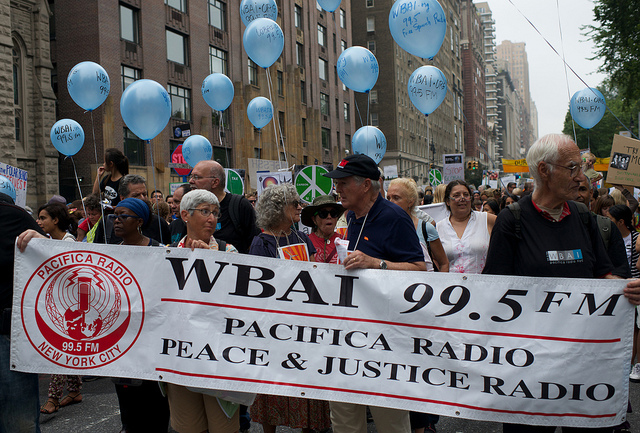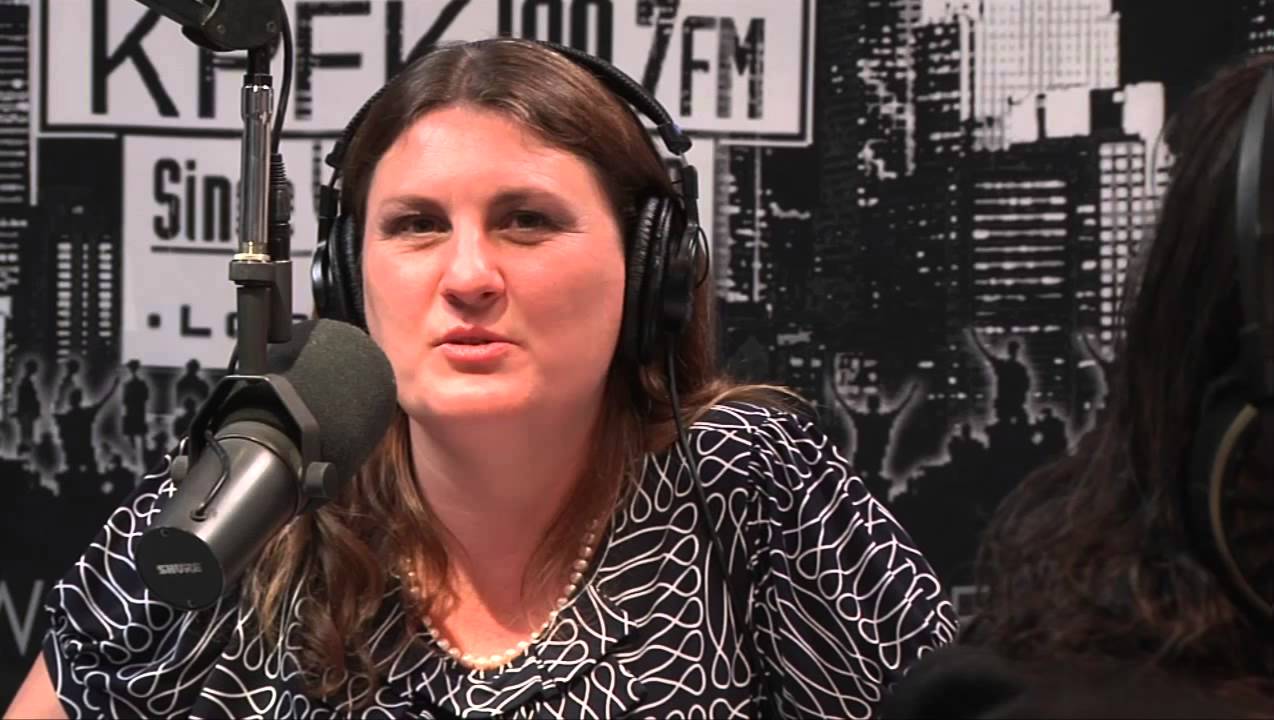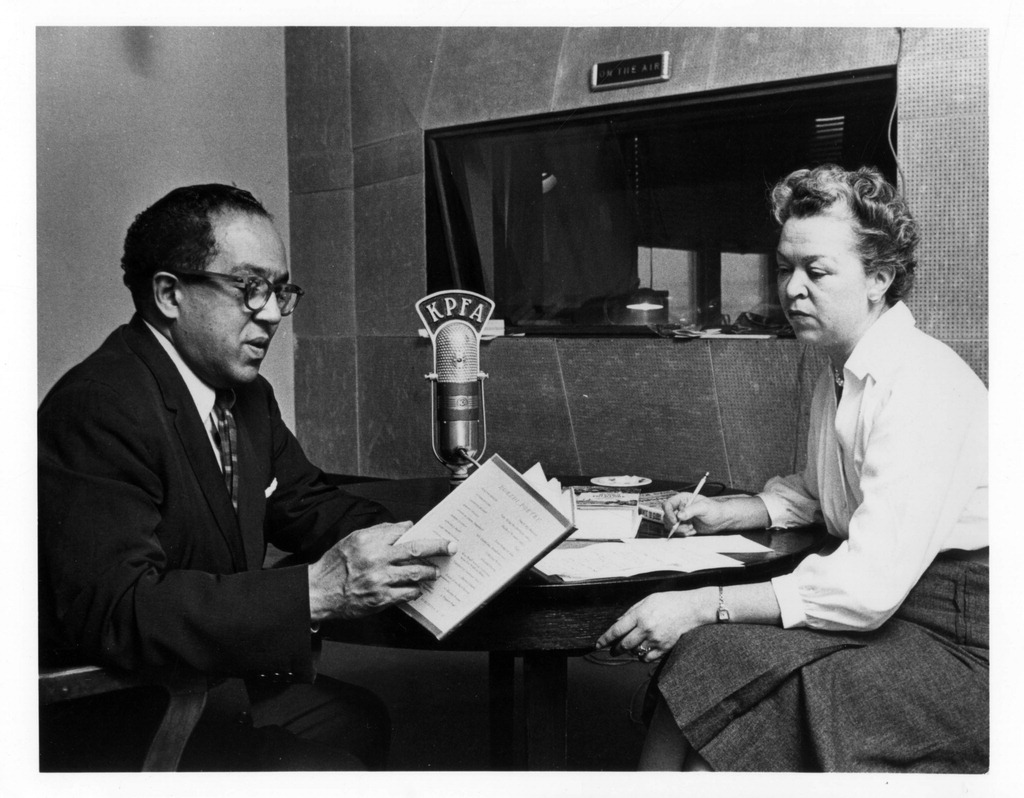The iconic Pacifica Radio network, one of the last remaining broadcast outlets for progressive voices, is facing an increasingly uncertain future.

Marchers carry WBAI banner at NYC People’s Climate Justice March, September 20, 2014. Photo from The City Project.
Pacifica Radio, one of the most iconic and last remaining outlets for progressive voices on the radio, is facing an increasingly uncertain future.
The network, which consists of five radio stations and dozens of affiliates across the country, has been full of dysfunction in recent years. The dysfunction has been caused by heated infighting caused by two factions vying for control of the network, the loss of important grant money, dwindling listenership, and near-constant fundraising and accounting hiccups.
[The Pacifica radio stations are WBAI in New York, KPFA in Berkeley, KPFK in Los Angeles, WPFW in Washington, D.C., and Houston’s KPFT.]
In recent weeks, anxiety over the direction of Pacifica has only increased.
In recent weeks, anxiety over the direction of Pacifica has only increased. In December, the California Attorney General demanded an in-depth audit from the organization. Around the same time, the current management, led by Margy Wilkinson, the chairman of the national board and the interim executive director, announced a plan to make layoffs and cuts in the amount of $500,000.
The details of the announced cuts have not been made public, but current and former Pacifica staffers have vocally denounced them. Wilkinson said in an interview with Truthout that the cuts are needed due to the “serious financial stress” facing Pacifica.
Meanwhile, the audit asks for a dizzying amount of financial information, which must be supplied by February 17 (following a one-month extension the AG granted in mid-January). Wilkinson said she was “confident they would be able to provide all the requested information.”
Some, however, are skeptical the requirements will be met. “Pacifica management is not going to be able to produce all the documents the Attorney General wants, even though those documents would be easy for just about any nonprofit to provide,” said former board member Bill Crosier in a statement sent to Truthout.
Crosier, and other members of Pacifica in Exile, cite the current leadership’s inability to complete its annual audit as a reason for the doubt, and they go further, saying in a press release that the current “chaos is not accidental, but is a purposeful attempt to drive the organization into bankruptcy court, where one or more of the multimillion-dollar radio licenses could be sold off to benefit the survivors.”
What caused the audit? Who is to blame?
What caused the audit? Who is to blame? These questions are answered very differently depending on which faction of the Pacifica community you speak with.
Supporters of former executive director Summer Reese, who was ordered to leave Pacifica after staging what was effectively an occupation of its headquarters in March 2014, blame the current management. Reese was ousted by a new board majority on March 13, but refused — with the support of numerous staffers — to relinquish control. Four days later, LA Weekly reported, “Reese marched to the Pacifica national office in Berkeley on March 17, bolt cutters in hand, removed a padlock placed on the front doors over the weekend, and essentially occupied the building.”

Summer Reese in screen grab from YouTube.
Wilkinson and her allies were locked out. “I’m not leaving the building until this is resolved by either the Attorney General’s office or the court,” Reese told the Weekly. “I don’t want these people to destroy Pacifica.” A court finally ended the occupation in May, with the Judge saying the ordeal was “a trespass and nuisance.”
Reese’s allies remain extremely critical
of the new leadership.
Since then, Reese’s allies remain extremely critical of the new leadership. “The rogue majority on the national board have forgotten their fiduciary duty of loyalty and care to the foundation and its subscribers, and it’s time for the AG to step in,” Shawn Casey O’Brien, a former board member and a member of Pacifica in Exile, said in a statement to Truthout.
Wilkinson, however, insists the current leadership was put in an impossible situation when they took over, following Reese’s occupation.
“Summer Reese barricaded herself to the office and denied access to members of the board. Since we have been back, we have found a mess,” she said. “Much of the problems stem from prior administrations. The [California Attorney General] is asking for records dating back to 2010, and I have only been here since March.”
Whatever burdens the audit may cause, both the current management and it staunchest critics told Truthout they welcome the audit.
Tracy Rosenberg, a former board chairperson, was among several former Pacifica board members who wrote complaints to the AG about Pacifica’s finances.
“I think the audit will help us get some accountability on these issues,” she said in an interview. “I don’t know what the [AG’s office] will do with the results of the audit, but some type of receivership to new leadership would be welcome.”
Wilkinson also said “the audit is probably a good thing… a lot has occurred, and it will be useful to see how things happened.”
Problems with fundraising, finances
Many of the financial problems — regardless of who is to blame — stem from Pacifica’s dwindling listenership and the corresponding decrease in fundraising. LA Weekly reported that, according to Nielson Audio, “during an average 15-minute period, just 700 people listen to its Los Angeles station, 90.7 FM KPFK.” The paper said New York’s WBAI has too few listeners to even “register on the Arbitron rankings.”
New York City’s WBAI has been ‘cut
to a skeleton crew.’
New York City’s WBAI has been “cut to a skeleton crew,” Rosenberg said, and is facing the harshest financial problems of the network’s five stations.
All of this has hurt fundraising considerably. Furthermore, the Corporation for Public Broadcasting, in early 2014, decided to withhold a significant grant — which Pacifica had relied on for many years — due to its inability to complete a 2012 audit. In California, the Non Profit Integrity Act, prompts all nonprofits, with more than $2 million in gross annual revenue (Pacifica has more than 10 times that amount), to submit an annual audit.
Wilkinson blames the lack of timely financial reporting on the Summer Reese administration, while Reese’s supporters blame the current management. This type of back and forth is typical for most issues facing the station: Each faction blames the other for whatever problems exist. A group called Pacifica in Exile, which is made up of former board members who oppose the current leadership, sent an email to Truthout showing reports that indicate missing data from Pacifica’s recent financial reports.
For the outside observer — and even for the majority of Pacifica members who support the network with donations — knowing who is at fault is a rather difficult proposition. Both factions have supporters who publish blogs and websites, and both claim to be fighting for what is best for Pacifica.
Pacifica members don’t seem to have a
dog in the fight.
Ironically, Pacifica members — who are the ones who determine which board members are elected — don’t seem to have a dog in the fight. Most do not vote in the elections — Pacifica has two, every three years, for seats on its board. The elections are costly and time-consuming, not to mention divisive. Recent efforts, for instance, to recall Tracy Rosenberg from the board were stalled by courts. The cost and difficulty of this election process — which many Pacifica insiders wish to abolish or reform — prompted The New York Times to headline an article, “Democracy May Prove the Doom of WBAI.”
Another controversy surrounding fundraising involved a third-party company that helps organizations manage donations. A company called Comnet, according to Rosenberg, was hired to handle donations that were typically handled by volunteers in the past. The problem, Rosenberg maintains, is that the company is run by a conservative campaign consultant named Bruce Hough who is a “supporter of the Tea Party” and has been accused by some in the Pacifica community of engaging in dirty tricks when campaigning for conservative candidates.
This affiliation led some at Pacifica to wonder if supporters would be hesitant to give business to a company run by someone whose ideology differs so greatly from that of most Pacifica listeners. Donations were down after the company was hired, Rosenberg said, though many variables could account for the drop. Wilkinson said these types of third-party contractors are mostly being phased out due to the cost of using them.
Debates over content
In addition to the fight over Pacifica’s finances, another debate has raged over content at the stations. In particular, there is a controversy over the use of programming by a host named Gary Null. Null, is a new-age, alternative medicine advocate who sells supplements and has written controversial books.
“The biggest problem with him” Wilkinson said, “is that many view him as an AIDS denier.” Indeed, ACT UP New York, a group that advocates for AIDS awareness and prevention, wrote a letter to WBAI/Pacifica, saying that “[o]ver the years, we have been repeatedly distressed about the life-threatening misinformation conveyed in Gary Null’s programming.”
Some argue that Summer Reese and her supporters are responsible for “scheming to turn over control of the organization to Gary Null,” according to LA Weekly.
Wilkinson says her “fervent hope” is to remove these types of shows from the programming. Not all agree. Shawn Casey O’Brien said he is “mostly agnostic” about Null’s presence on the radio. “He has a lot of his own fans… I know he brings in a lot of money,” he said.
Norman Solomon says that Gary Null’s show ‘has no place on Pacifica.’
Media critic Norman Solomon, who is a listener and supporter of San Francisco’s KPFA, disagrees. “That is terrible. That type of show has no place on Pacifica,” he said to Truthout.
The importance of Pacifica’s survival
Solomon points to the greatest problem that Pacifica is facing. Despite its many difficulties, Pacifica is one of the last places for progressives to be heard on radio. Formed in 1949 by a conscientious objector during World War II named Lewis Hill, the institution has been a crucial vehicle for leftist thought. It has also stood up to power and oppression, including facing an investigation by the House Un-American Activities Committee, spearheaded by Joe McCarthy, for being subversive. (For more information on the history of Pacifica, see this timeline.)
“A lot of people in some parts of the country… they hear NPR and think that is real progressive radio, since it is all they have.” Solomon said, noting that NPR has many of the same institutional biases as corporate media. “This is why places like Pacifica are so important.” Fairness and Accuracy in Reporting (FAIR), which Solomon serves as an associate, has done numerous studies documenting the flaws of public radio, including a 2004 article in Extra!, which “shows the radio service relies on the same elite and influential sources that dominate mainstream commercial news.”

Leftist poet Langston Hughes with Eleanor McKinney at KPFA in Berkeley, 1958. Image from Berkeley Public Library.
The radio world is dominated by right-wing talk radio these days. The liberal station Air America died out years ago. Even in liberal areas such as Boston, progressive stations — such as 1510: The Revolution — have died out and been replaced by right-wing stations.
Consolidation has left the media landscape in the hands of a few corporations.
Media consolidation has left virtually the entire media landscape in the hands of just a few corporations. Clear Channel, which is owned by Bain Capital, is the most extreme example of this. With more than $6 billion in annual revenue (about half of which comes from radio), Clear Channel controls, according to Freepress, “866 radio stations and Premiere Radio Networks… serves nearly 5,800 radio station affiliates and has over 213 million weekly listeners.” The company’s programs include the Rush Limbaugh Show, Glenn Beck and the Sean Hannity Show, and Fox News Radio.
The future of progressive thought on the radio is not the only thing at stake. As Rosenberg notes, Pacifica owns “five valuable licenses that are independently controlled — not owned by corporations or a government.” The five licenses, she argues, “are the most important things and need to be preserved.”
There has been speculation that one or more of these licenses could be sold to help Pacifica to improve its finances. Rosenberg said she opposes such a move. But these licenses are the most valuable asset Pacifica has. “Its five broadcasting licenses alone could be worth $50 million to $100 million,” according to LA Weekly.
“It is a difficult situation. Things that once seemed unthinkable, now might be on the table.” Solomon said.
In light of this, preserving Pacifica as a viable media entity is a major priority for many supporters of independent media.
“We are going through a problem that a lot of nonprofits are going through, and we hope people will want to donate,” Wilkinson said. “Pacifica plays an important role in public discourse.”
“Democracy Now!,” which has become something of a flagship show for the American left, is by far the most popular show aired on Pacifica. The show is now its own entity and is not owned by Pacifica. In fact, Pacifica is in debt a sizable amount to the show — a scenario that has caused even more friction in the Pacifica community. But Amy Goodman, the host of “Democracy Now!,” continues to help raise funds for all five channels in Pacifica.
On the 60th anniversary of Pacifica, Goodman argued that Pacifica is a “sanctuary of dissent” and vital to “the tradition of dissent and the power of diverse voices to resolve conflict peacefully.”
The question remains, however how this tradition will continue in the future, as independent radio increasingly becomes a thing of the past?
This article © Truthout.
Also see “Pacifica Radio on the brink” by Marlo Blue on The Rag Blog, June 21, 2014.
[Michael Corcoran is a journalist based in Boston. He has written for the Boston Globe, The Nation, the Christian Science Monitor, Extra!, NACLA Report on the Americas, and other publications.]




















The “majority” that ousted Reese is not lawful. One member of that ruling faction clings to a seat on the board, despite the Pacifica bylaws (art. 5, § 1, ¶ B) under which he has resigned because he simultaneously serves as a commissioner on Advisory Neighborhood Commission 1B of the District of Columbia.
Another de facto director, also a member of that faction, has drug convictions. Under the Anti-Drug Abuse (part of the “war on drugs,” like it or not), he clings to a seat on the board, jeopardizing the issuance of all licenses and permits from the FCC to Pacifica, which could not continue broadcasting any full-scale radio without him. And that de facto director has a fiduciary duty to be loyal to Pacifica! (How can he be loyal when his very presence on the board jeopardizes Pacifica’s nonprofit mission?)
(How can a lawful vote be cast by a director of a corporation who, under its own bylaws, has resigned? Or by a director who defrauds the corporation to which he has a legal duty to be loyal, even jeopardizing its nonprofit mission by his continued presence on the board?)